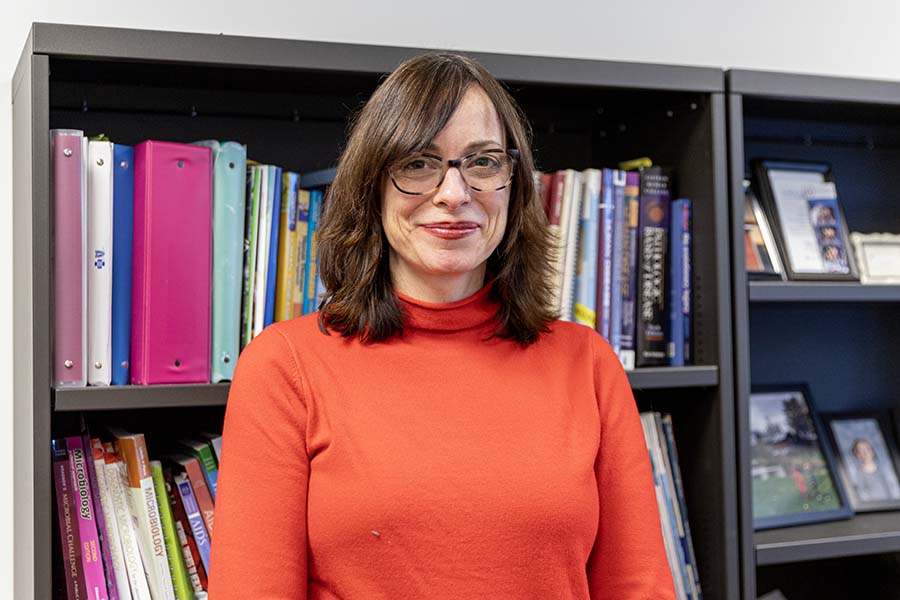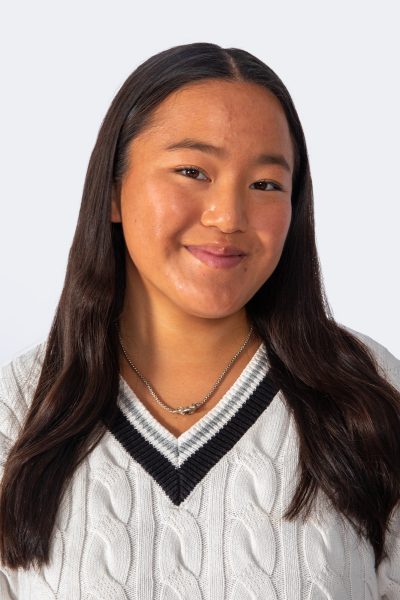Kari Brossard Stoos, associate professor and associate chair of the Department of Health Sciences and Public Health, is helping train future health professionals at Ithaca College by offering health courses that focus on concentrated topics about primary global health issues.
Brossard Stoos will be teaching three new health courses in Spring 2025 called Introduction to One Health, Let’s Talk about Periods and Antibiotic Resistance: The Creeping Pandemic. Brossard Stoos said these courses are an effort to educate health care leaders-in-the-making about the World Health Organization’s objectives, and provide a space for students to discuss pressing global health care concerns.
Antibiotic Resistance: The Creeping Pandemic and Let’s Talk about Periods will be 1-credit classes. Introduction to One Health will be 3-credits and can satisfy the Natural Sciences requirement for the Integrative Core Curriculum. While there are some prerequisites for Let’s Talk about Periods and Antibiotic Resistance: The Creeping Pandemic, Brossard Stoos said she is willing to allow students passionate about the topics into the class.
News Editor Prakriti Panwar spoke with Brossard Stoos about why she feels these topics are necessary to talk about and what she hopes students learn from them.
This interview has been edited for length and clarity.
Prakriti Panwar: The three new courses being offered seem very specific. Is there something that has prompted these courses?
Kari Brossard Stoos: The World Health Organization’s goal is to try to reduce the growing threat of antibiotic resistance. … It’s really timely and important that we address this growing problem of antibiotic resistance. … It’s really important, as we are training future health professionals … that they have a better understanding of how significant this problem is. That prompted [this] 1-credit course. Let’s Talk about Periods is also really timely in a time when policies are changing [and] gynecological issues are getting politicized. If you listen to the conversations about how they’re getting politicized, the biology is missing and the understanding of some of these issues is missing. … I’ve noticed more and more students are coming in without an understanding of, first of all, menstruation, and then second of all, issues that are associated with menstruation. I’m also noticing that the conversation around this is never comfortable … so I just want people — especially public health professionals and future health professionals — to really be comfortable talking about periods. … The third one is an Introduction to One Health which talks about the intersectionality between human health, animal health and environmental or planetary health. … So, if we as humans are failing in our health, there’s got to be something else going on with animals and our environment.
PP: It sounds like these courses are a step toward thinking about a bigger picture. Would you say [Ithaca College] is ahead of other colleges in terms of that? Or are other colleges also offering courses like this?
KBS: Other colleges offer classes in One Health. I think we are a little forward thinking [in terms of] pulling out specifically the [topic] of periods and pulling out specifically the antibiotic resistance topics into their special, own little concentrated topic areas for discussion. … We just felt the need to really highlight them, to pull them out and really give them more time to examine more details.
PP: What do you hope students take away from these courses?
KBS: The thing I really want to change, especially with the discussion about periods, is a greater understanding of these two pathologies that I pointed out in the title of the class: endometriosis and [Polycystic ovary syndrome]. The reason being that it takes an average of seven years and several doctors to be diagnosed at least with endometriosis. And so one of the goals for me is to have people who menstruate … to just be aware of what these things are and to be a more educated health care consumer, to ask the right questions. The other thing is those who are going to be providers [should] know a little bit more about endometriosis or PCOS before they get into their professional training. … So if we can be at the undergrad level just planting the seed, then when you get to the higher-ups in your training to be health care providers or public health professionals, you can do further work to better understand it and to make a change in the shift of the time it takes for someone to get a diagnosis and then get some help.
PP: Would you say these courses are part of some kind of strategic effort, or is it just something that you personally feel very strongly about and want to pass down to your students?
KBS: It’s a little bit of both. Selfishly, I’m like, “This is stuff I think is really cool,” … but I also think it is strategically part of this bigger idea of, “Let’s make sure we are current in following these major issues in health.” … We have other folks in the department that really focus on maternal and child health overall [which] is a huge issue globally. As we navigate toward those topics, it is strategic for the department to really focus on some of these really consistent problems throughout health that are still problematic.








